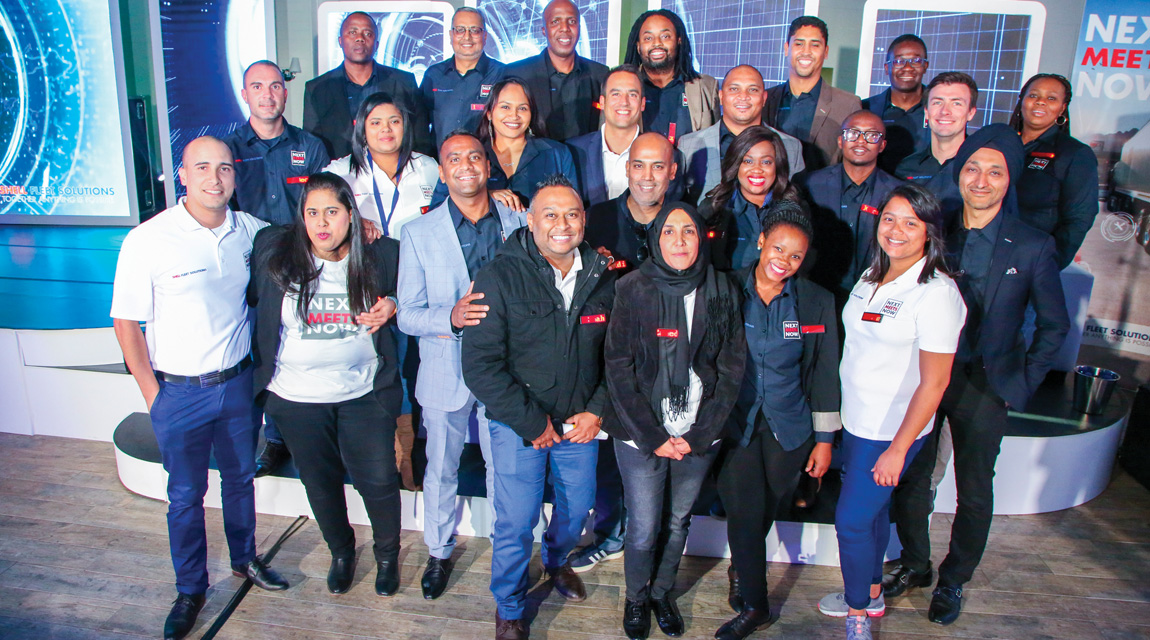Next meets Now in the drive for digital disruption

The Fleet Solutions division of Shell South Africa is heading for an increasingly digital future, as it sets out to reshape the fleet world as we know it today, writes Gavin Myers.
“Disruption” is one of the most talked about buzzwords in today’s boardrooms. As technology evolves and becomes ever more integrated into our daily personal and professional lives, more and more of the traditional ways of doing things are opened up for new, better ways to take over.
Similarly, the fuel supply industry faces numerous challenges in the coming decades – the demise of fossil fuels and the rise of electric and alternative power, changing travel patterns from personal transport to the likes of e-hailing services, as well as the already increasing use of drone delivery for last-mile logistics and the impact this has on the transport and logistics sector.
In preparation for this “disruption” to its century-old business model, Shell is looking to a new, digitised future across all its business units. The company is, essentially, being its own “disruptor” and getting ahead of the trend.
The future direction for the brand is immediately evident with the recent name change of its Commercial Fleet division, which is now known as Fleet Solutions.
Speaking at Shell South Africa’s recent Next Meets Now conference, Parminder Kohli, global marketing manager, business development and operations manager at Shell, explained that technology and digitisation are driving economic disruption across all industry sectors. Many of these sectors impact directly on Shell’s business units, for example, it’s fleet-card business.

“In less than a decade, the payment industry will be severely disrupted – a key consideration when the Shell Card is at the heart of Shell’s payments business,” he said.
Considering that Shell South Africa’s fleet-card offering is now 35 years old – and the company’s fleet-card business is represented in 23 countries, with two-million customers transacting at 200 000 Shell and Shell partner sites every day – the company is right to try to avoid disruption.
On the other hand, the world is going to need up to 30-percent more energy than it does today by the time its population reaches nine billion. It is estimated that the population of Africa will double in the next 30 years, representing the biggest growth rate in the world. “Urbanisation will be huge; 800 million people will move to cities in the next 30 years,” Kohli said.
“All this is taking place against the backdrop of climate change… We need to find a way to balance it all. The world needs a mosaic of solutions, including different and varied energy sources, and Shell needs to play a part as an energy company,” he added.
For example, says Kohli, Shell has recently bought New Motion – Europe’s largest network of electric-vehicle charge points. It has also developed a range of new solutions to complement its fuel offering; many of which will have a direct benefit for the transport and logistics industry.
These include telematics for analytics, fuel reporting and route optimisation; freight optimisation, last-mile and long-haul solutions; fleet-management services specific to business-to-business customers; and e-road services.
“The ability to generate and process enormous amounts of data is already a huge enabler for the fleet industry. It is also opening the doors for lots of new players who can manage data better than old, traditional transport companies.
“Data is enabling last-mile delivery, or full-return loads via e-platforms. Just look at how Amazon is redefining the logistics business with its drones, for example – and this is only going to increase,” he suggested.
Happily, customers of Shell Fleet Solutions can already begin to take advantage of some of the company’s new products and solutions.
Bongani Motloung, sales manager, Shell Fleet Solutions, noted: “Our customers’ needs have changed and we want to make life better and easier for them, every day. Everything we do is about the customer.
“We are making lots of changes, from hardware – including how our forecourts look – to software implementation and the personal attention given by our forecourt attendants and our sales staff,” he added.
With that in mind, Shell Fleet Solutions has launched a unique, “fit-for-purpose” solution for all its fleet customers: real-time SMS notifications.
“The system highlights suspicious transactions and then immediately alerts operators via SMS. This allows them to act while the incident is still fresh and evidence is still available for investigation,” explained Thayuri Moodley, Shell South Africa marketing manager.
Over the past few months, in the lead up to the system’s launch, Shell worked with a bus-fleet customer who has been experiencing suspicious transactions. The system successfully flagged three suspicious transactions that proved to be fraudulent. These cases have since been passed on to the Shell Fraud Support division, which, among other services, offers dedicated fraud analysts and fraud investigations.

In fact, the Shell Fleet Solutions service offering extends to four core business functions. These include:
• Fleet mobility – The aim is to put control at the customers’ fingertips. This includes services such as the new Shell T-Card that allows for data capturing with incentive reporting intelligence and tracking; and the Shell Card Online web portal, which allows customers to manage all aspects of fleet management.
• Security – “South Africa faces many unique challenges. We need to build a solution that’s fit for purpose,” noted Moodley. These solutions include real-time fraud detection and action, as well as proactive and reactive features to keep customers in control of their fleet from anywhere.
The abilities include the facility to manage, block and unblock cards instantly; customise limits according to up to nine alert parameters that the customer can define; as well as improved security at all Shell sites.
• Customer experience – It is not only the high quality of its fuels – which is the result of years of research to improve fuel consumption, lower CO2 emissions and lower vehicle operating costs – that define Shell. It’s network of 630 sites and 477 participating sites is now being augmented with the new Shell Truck Diesel concept.
These new sites feature higher canopies for larger vehicles, easy access, high speed pumps, parking and overnight facilities, showers, hot food and security. There are currently 70 such facilities countrywide.
• Convenience retail – Creating even more value for its patrons, Shell Fleet Solutions has taken customer feedback to heart and put together in-store offers exclusive to Shell Card users – easing the long-haul life on the road.
“Our ambition is to be the favourite forecourt retailer in South Africa,” reiterates Motloung. Naturally, data is driving this vision.
“Data really is the new oil; it’s the new resource to power humanity,” Kohli restated. “The world of the future is full of opportunities, and Shell Fleet Solutions will be there every step of the way.”
Published by
Focus on Transport
focusmagsa




